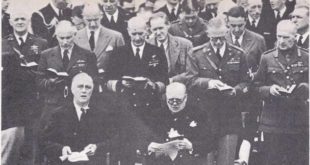Stalin had left behind him a world of suspicion, distrust and fear. Suspicion, distrust and fear were as great in his own country as anywhere else, for he had ruled as a dictator and had never set up a definite procedure for transferring power to another leader. Immediately after his death, a five-man presidium, or council, took over the rule of the Soviet Union. The presidium chose Georgi Malenkov, who had been Stalin’s right-hand man, as the new premier, but a number of factions were struggling for control of the government and one of them was led by Lavrenti Beria, …
Read More »Tag Archives: Prime Minister Churchill
Victory in Europe 1941 – 1945
Even before Pearl Harbour, there had been cooperation between the United States and Britain. In August of 1941, President Roosevelt and Prime Minister Churchill met secretly, on a cruiser at sea off the coast of Newfoundland. There they drew up the Atlantic Charter, a document stating the principles on which they based their hopes for a better future for the world. They pledged that neither country would seek more territory. They hoped that, “after the final destruction of Nazi tyranny,” all men in all lands could “live out their lives in freedom from want and fear,” and they called on …
Read More »
